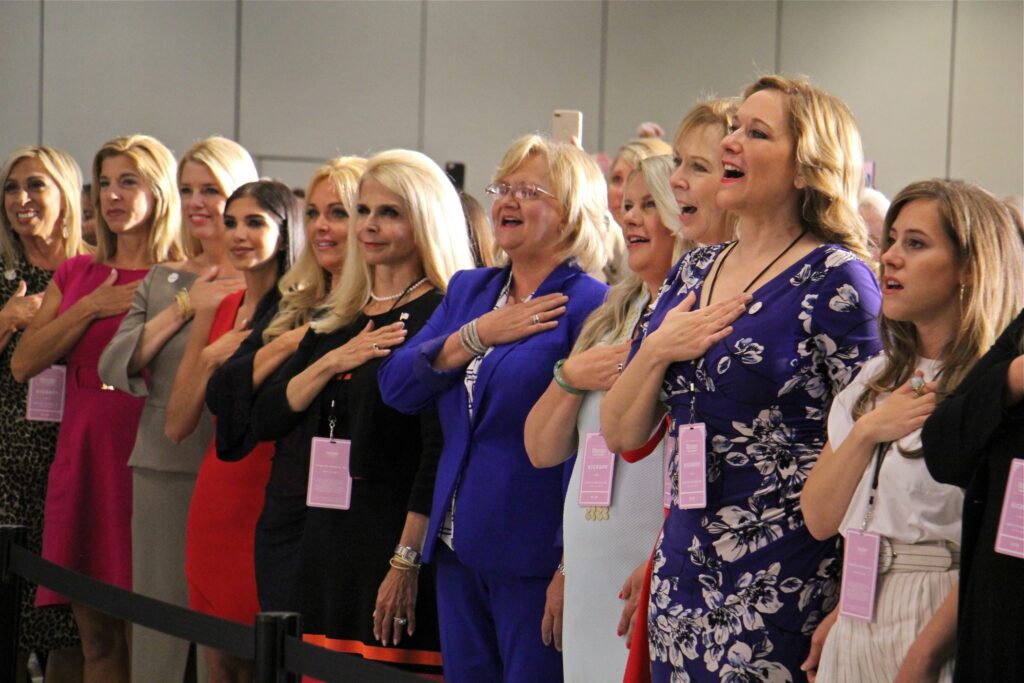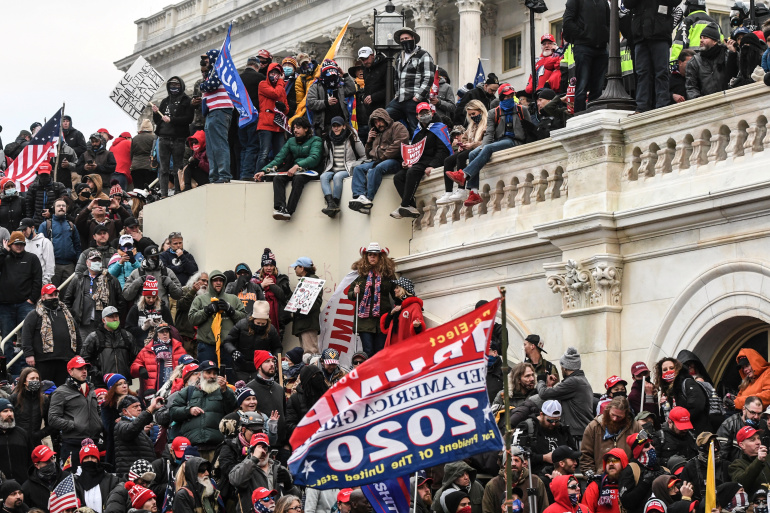On January 6, Ashli Babbitt, 35, became a martyr. The Air Force veteran was in the act of scaling a barricade of furniture in Washington DC’s Capitol when she was shot in the chest at point blank by a security officer.
Babbitt, a Trump diehard and QAnon sympathiser, was one a handful of women among the insurrectionist mob of mainly white, middle-aged, right-wing men who stormed the Capitol.
As of January 19, of the 99 people who had had cases brought against them for their participation in the attack on the US Capital, 86 were men and 13 women. More broadly, an online tool PIRUS, which profiles individuals affiliated with far-right groups in the US, found that of the 922 individuals it identified, only 52 were female.

Ashli Babbitt and husband Aaron
Which raises the question of why are there apparently so few women engaged in extreme right-wing activism? And, of those who do engage, is their role mainly that of moral support to the men?
Well, no, says Kristy Campion, a historian and expert in terrorism at the Australian Graduate School of Policing and Security at Charles Sturt University.
“There is an emerging stereotype of right-wing violence that it is exclusively male,” Campion tells BroadAgenda. “We are making the same mistakes as we made about women in Islamic State which is assuming women are non-violent actors.”
Women often play a significant role but more often as influencers, motivators and content producers on social media channels, such as YouTube and Twitter.
In fact, says Campion, women often play a significant role but more often as influencers, motivators and content producers on social media channels, such as YouTube and Twitter.
“Women’s ability to promote and cross promote information is significant,” says Campion. “They are often quite organised in how they engage with each other.”
In a recent paper for the journal Social Sciences, Campion argues there are six forms of participation for women extreme and radical right-wing groups – violent actors; thinkers; facilitators; promoters; activists; and gendered exemplars. While it is rare for women to operate as lone actors in perpetuating violent acts – when they do engage in it, it is almost always in cahoots with men – they are more likely to “facilitate or sustain violent operations through engaging in support activities that contribute to mission completion”, Campion writes.
“While right-wing violence is overwhelmingly perpetrated by men, women can also pose violent and non-violent threats and can influence ideology despite the presence of misogynistic content. This is because women interact within the ideological ecosystem rather than passively receive content.”

Trump supporters sing the “Star Spangled Banner”.
Indeed, many women involved in extreme right-wing groups subscribe to the notion saving “lost womanhood”, a narrative that can be seen playing out in such groups as Tradwives.
Writing in The Conversation, University of York PhD candidate Catherine Stinton noted the apparent irony of women being attracted to groups that are violent, macho and outright misogynistic can seem baffling.
“But while this [misogyny] can be an article of faith for many of these movements, it tends to be anti-immigration and anti-government activism that are their key recruitment messages,” Stinton writes.
While misogyny can be an article of faith for many of these movements, it tends to be anti-immigration and anti-government activism that are their key recruitment messages
“Women largely get involved with the far right for the same reasons men do – most commonly radicalised by a fear of losing what they have and feel entitled to keep.”
Campion notes that women play “a role in both ideological creation and magnification”.
Both Campion and Stinton argue that women involved in right-wing extremism are not an oddball collection of “lone, pitiable, naive individuals” but rather finds “women expressing, perpetuating and organising hate with as much agency and vitriol as men”.
“Even if the ideology of the far right puts them second to men, that’s still a privileged position above non-white people in a white supremacist society,” writes Stinton.
“The enforcement of this racialised hierarchy is a role that women have played throughout history. Some will accept this as a compromise, while others rationalise this as still being in their self-interest.”

Storming of the Capitol.
Campion agrees: “A lot of the women who are posting of Facebook and making YouTube videos are doing it from the position of feeling righteous and justified. They think they are saving America,” she says.
Right-wing groups also need women to help “soften” the gun-toting image, but also to keep male members.
“These groups of very cognisant of the fact that if they want to keep male members, they have to attract and keep female members. If the wife isn’t committed, the husband might leave,” says Campion.
So while women are treated as second-class citizens they are simultaneously put on a pedestal.
The white supremacist core of the far right holds women in a particularly privileged place. As wives of their warriors and mothers of future white children, they are expected to stay at home and commit to the family.
“The white supremacist core of the far right holds women in a particularly privileged place. As wives of their warriors and mothers of future white children, they are expected to stay at home and commit to the family,” writes Stinson.
Indeed, these women are not hapless, naïve, unthinking consorts to men who hold whacky ideas. They are not forced or coerced into participating with these groups and espousing radical theories. Instead, they are individuals with agency and free will who internalise and externalise intense racism and hatred.
When Joe Biden is inaugurated tomorrow, if there is violent protest and insurrection as predicted, rest assured many women will also be involved. And like their male counterparts, they will also be throwing bombs – just not of the physical variety. But of the kind ratcheting up hatred and fear on YouTube, Facebook and Twitter.




